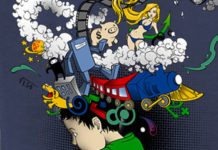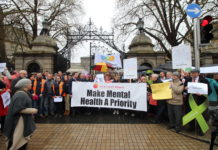Researchers Reveal Misconceptions About ADHD
A new article explains common misconceptions about ADHD that are held by teachers and mental health professionals and may lead to overdiagnosis and overmedication in schools.
Lee Coleman – The Reign of Error
An interview with Doctor Lee Coleman, psychiatrist and author of the 1984 book Reign of Error. Now retired, Lee devotes his time to public education that exposes the individual and public harms from today’s “mental health” industry.
Tapered Antipsychotic Withdrawal Mitigates Risk of Psychotic Symptoms
Research suggests that slowly tapering off an antipsychotic reduces the risk of withdrawal psychosis compared to abrupt discontinuation.
Antidepressant Use Does Not Prevent Suicide, Study Finds
A new study has found that antidepressants are ineffective for reducing suicide attempts. Researchers report that the risk of suicide is particularly high in the first month after starting an antidepressant.
Chronic Stress and “Mental Illness”
Could it be possible that what we call “mental illness” is a direct consequence of the changes that occur in the body as a result of trauma and chronic stress?
Drug Treatment in Medicine and Psychiatry: Papering Over Important Differences
The treatment of mental disorders with drugs is not the same sort of activity as the use of drugs in medicine. The ethical implications of the two situations are different. Insisting on equating the two obscures these differences and presents the use of drugs for mental distress as less controversial than it actually is.
Growing Evidence for the Link Between ADHD Diagnosis and Age at School Admission
Researchers detect a striking relationship between the month of school enrollment relative to peers and patterns of ADHD diagnoses in a large sample of elementary school students throughout the US.
The Salvation of Psychiatry
Hope lies in psychotherapy. It is a purely human practice, based on the development of real trust and genuine responsiveness. It is not an analytic process, but a feeling one. We need to return to a psychiatry that respects the complexity of human nature. We need to go beyond ‘do no harm’ and promote genuine healing.
How to Integrate Culture into Mental Health Care
Researchers explore how culturally responsive services can create greater equity in mental health care.
Much of U.S. Healthcare Is Broken: How to Fix It (Chapter 1, Part 2)
Les Ruthven addresses off-label prescribing as well as physicians’ anti-science pushback against the use of well-conducted clinical trials.
Rates of Opioid Use Remain High Among US Adolescents
Researchers investigate trends in opioid use, prescriptions, misuse, and access reported by adolescents and young adults.
Fighting for the Freedom to Hear Voices
We were caught in a tug of war. They wanted my voices gone. I was not going to let go of my voices, my confidants and protectors, regardless of what they did to me. We have the right to hear voices and no longer be hidden away in the attic of taboo and misunderstood experiences. The freedom to hear voices is truly a fundamental human right.
Psychologists Advise How to Help and Minimize Harm Working With Migrants and Refugees
While well intentioned, providers and volunteers can do more harm than good at the border. The Global Psychosocial Network issues guidelines on how to work for the benefit of migrants and refugees.
Technology Not a Strong Factor in Adolescent Well-being, New Study Claims
A new study suggests digital media use among adolescents has a smaller negative effect on well-being than bullying or smoking marijuana.
Mindfulness Improves Resiliency to Stress in University Students
New research demonstrates the lasting effects of mindfulness training on stress and wellbeing among university students.
Dear Psychiatrist: I Almost Died Under Your Care
Dear Psychiatrist: What were you thinking when you prescribed me nearly 800 pills of Xanax in under seven months?
Veterans with both PTSD and Dementia More Likely to be Prescribed Antipsychotics
Researchers found that veterans with both conditions had higher odds of being prescribed second-generation antipsychotics than those presenting with just PTSD.
Data Challenges Superiority of Manualized Psychotherapy
New data fails to support the promotion of manualized psychotherapy as superior to non-manualized forms of psychotherapy.
What is Holistic Psychiatry?
Holistic psychiatry teaches that within each and every one of us there are great and latent powers, which are beyond the ordinary life. Daily progress in self-development is not the result of accident or chance, rather it comes from a steady practice of working on yourself.
Real People, Real Side Effects: Stories of Sexual Dysfunction
Research shows that psychiatric drugs seem to have an impact on libido, so I decided to collect personal stories to complement the evidence of side effects from psychotropic medication already available. Libido can be directly linked with wellness, and patients need more information to make the choice right for them.
Questioning the Integrity of Psychiatry
The Royal Australian and New Zealand College of Psychiatrists claimed that “the prescription of antidepressant or antipsychotic medications is something that a psychiatrist only ever does in partnership with the patient and after due consideration of the risks and benefits.” How could a responsible professional body make an assertion so patently wrong?
A New Paradigm for Testing Psychiatric Drugs Is Needed
This paper reviews the problems with the usual double-blind, placebo-controlled trials on which drug approvals are based, and advocates for a stricter form of testing psychiatric drugs with patient-relevant outcomes, real comparators, long-term outcomes, and assessment of harms.
Loneliness Is Deadlier Than COVID
What we are being required to do and what many are rightly electing to do for their own health—that is, social distance, isolate and quarantine—are exacerbating the felt sense of loneliness that was an epidemic long before the present crisis. The coronavirus pandemic has made it obvious that the precious-sounding axiom “we need each other” is quite literal.
A Brave New World – Somatic Psychiatry in the Spotlight
Historically, psychiatric diagnoses were never intended to signify literal brain diseases. They used to be a shorthand and a guide to point to the psychological issues that presented. This is how it still should be today. The way diagnosis is now used is a travesty.
Holistic Approaches: A Proven Treatment for Psychotropic Drug Withdrawal
Published in the peer-reviewed journal Advances in Mind Body Medicine, this case series is the first of its kind to document the methodology employed in the successful discontinuation of a range of psychotropic medications, with holistic support interventions providing long-term mood support.

































